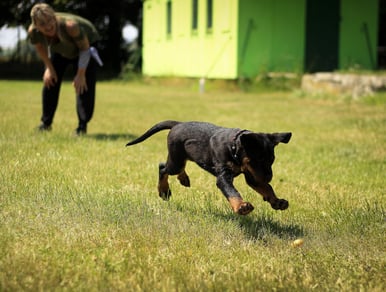 Training a puppy requires a great deal of patience and consistency.
Training a puppy requires a great deal of patience and consistency.
Because January is National Train Your Dog Month, we thought this would be a perfect opportunity to share some of the puppy training tips that students in the Animal Assisted Therapy program are learning every day in their classes.
But first, what's the big deal? Why even bother training your puppy?
Benefits of Training Your Puppy
According to the Association of Professional Dog Training (APDT), there are many benefits to having a trained dog. In additional to the benefits of them knowing basic good manners, other benefits include:
- Puppy training classes provide the experiences and opportunities for your puppy to develop interaction skills with other puppies, with people, and in new environments.
- Puppy training classes often foster socialization, which has been found to be critical to the psychological health of adult dogs.
- Training classes provide dog owners the skills and knowledge for dealing with common, normal dog behaviors—starting with puppy behaviors such as housetraining and chewing.
5 Puppy Training Tips
1. Create a "den" for your puppy
-1.gif?width=319&name=giphy%20(3)-1.gif)
According to American Humane, dogs are den animals. Because of this, it is essential that the dog has some place where they are able to escape to when they are feeling stressed or anxious.
Many people will use a crate, or an indoor doghouse for this purpose. According to American Humane, "[A crate can] be an ideal tool to housetrain your pet or to keep canines that suffer from separation anxiety from destroying the house while you run a few errands."
Creating a space like this will also allow you to effectively discipline your dog using time-outs.
2. Reward good behavior
.gif?width=273&name=giphy%20(6).gif)
This seems pretty obvious, but how should you reward good behavior? Good behavior can be rewarded by:
- Treats
- Toys
- Love (i.e. belly rubs and back scratches) and Praise (i.e. "What a good boy! Who's a good boy? You're a good boy!)
If you use treats, it is important to make sure training treats are high-quality, but not packed with too many calories if they’re being used daily.
When choosing a treat, Amber Drake, a canine behaviorist recommends that you check out the ingredients list to make sure the first ingredient is not a by-product.
3. Don't engage with all negative puppy behavior
-1.gif?width=266&name=giphy%20(4)-1.gif)
Remember how I said that puppy training requires a great deal of patience? This is why.
Misbehaving puppies are constantly seeking your attention, so when bad behavior occurs such as begging for food, it is important to remain calm and not engage with them.
Instead, the American Kennel Club recommends setting your puppy up for success: "For example, tell the begging dog to go to his place and lie down, and give him a treat when he does."
4. Don't use aggression with your puppy
-1.gif?width=342&name=giphy%20(5)-1.gif)
In the past, training techniques around aggression were used as a training tool, however, many now believe that it is ineffective.
According to an article on Pet Expertise, "Punishments [that use aggressive behavior] are risky because they can cause fear, and fear is a major cause of aggression and shyness."
5. Correct mistakes quickly
-3.gif?width=278&name=giphy%20(1)-3.gif)
When training your puppy, it is important that you reprimand them immediately during or after bad behavior occurs.
According to a 2015 study, dogs may actually forget events less than two minutes after they happened. Because of this, discipline that does not occur within those two minutes may leave your puppy confused.
Not sure that you have what it takes to train your own puppy? That's okay -- our students might be able to help.

At Hocking College, our Animal Assisted Therapy students are taking a variety of courses in canine training and will be working in our live-learning lab in Nelsonville upon its completion. At this facility, community members will be able to board their pets and get grooming services from the students.
The Hocking College Foundation is now accepting donations to help fund the renovations of this space. If you're interested in contributing, please click here and select "Animal Assisted Therapy" on the designation dropdown.



